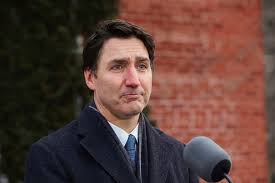TORONTO: Finally putting an end to months of speculation, Canada’s Prime Minister Justin Trudeau resigned as the Prime Minister and leader of the Liberal Party on Monday. His position had become untenable following the resignation of his once-trusted colleague and Deputy Prime Minister, Chrystia Freeland, last month. Her departure triggered fresh demands for Trudeau’s resignation not only from opposition leaders but also from numerous Liberal MPs.
Trudeau’s resignation signals a pivotal moment for Canada, as it grapples with internal political shifts and external global challenges. Meeting with Governor General Mary Simon, Trudeau recommended proroguing Parliament until March 24 to facilitate the selection of a new leader. “This country deserves a real choice in the next election,” Trudeau asserted, emphasising the need for a fresh perspective amidst internal party strife.
He said, “I intend to resign, as party leader, as Prime Minister, after the party selects its next leader through a robust nationwide competitive process. Last night I asked the president of the Liberal Party to begin that process. This country deserves a real choice in the next election, and it has become clear to me that if I am having to fight internal battles, I cannot be the best option in that election.”
In an emotional address to Canadians, Trudeau said, “Since 2015, I’ve fought for this country and for you. To strengthen and grow the middle class. We rallied to support each other through the pandemic, to advance reconciliation, to defend free trade on this continent, to stand strong with Ukraine and our democracy, and to fight climate change and get our economy ready for the future. We are at a critical moment in the world.”
Calling himself a “fighter”, Trudeau said, “Every bone in my body has always told me to fight because I care deeply about Canadians. I care deeply about this country, and I will always be motivated by what is in the best interest of Canadians. And the fact is, despite best efforts to work through it, Parliament has been paralysed for months after what has been the longest session of a minority Parliament in the Canadian history.”
While journalists questioned the timing of his resignation in the wake of the no-confidence motion threats by the opposition parties once the House reconvened in January, Trudeau said he had advised the Governor General that a new session of Parliament was needed, and she granted this request. On his long silence since Freeland’s resignation, Trudeau said over the holidays, he got a chance to reflect and also had long talks with his family about his future and arrived at the decision to quit.
He expressed the hope that the new Prime Minister and leader of the Liberal Party would carry its values and ideals into that next election. “I’m excited to see the process unfold in the months ahead. We were elected for the third time in 2021 to strengthen the economy post-pandemic and advance Canada’s interests in a complicated world, and that is exactly the job that I and we will continue to do for Canadians.” Responding to a question on his biggest achievement in the last decade as the Prime Minister, he said, in 2015, we were elected on our promise to work for the middle class in this country, and that is what we did. We’ve reduced their taxes, we increased the benefits to families, we made sure the economy was focused on working for everyone and not just a few.”
Responding to a question on Conservative leader Pierre Poilievre, Trudeau said, “His vision for this country is not the right one for Canadians. Stopping the fight against climate change doesn’t make sense. Backing off on the values and strengthening diversity that Canada has always worked to pull itself together on is not the right path for the country. We need an ambitious, optimistic view of the future, and he is not offering that.” He expressed confidence that Liberals have a lot of leaders to take on Poilievre.
Trudeau came to power in 2015 after 10 years of Conservative Party rule, and had initially been hailed for returning the country to its liberal past. But the 53-year-old scion of one of Canada’s most famous prime ministers became deeply unpopular with voters in recent years over a range of issues, including the soaring cost of food and housing, and surging immigration. The political upheaval comes at a difficult moment for Canada internationally. US President-elect Donald Trump has threatened to impose 25% tariff on all Canadian goods if the government does not stem what Trump calls a flow of migrants and drugs into the US.


